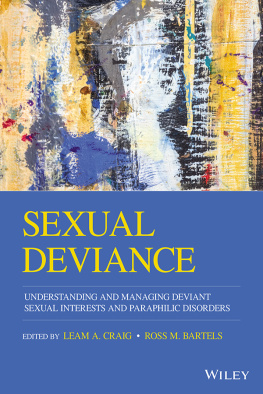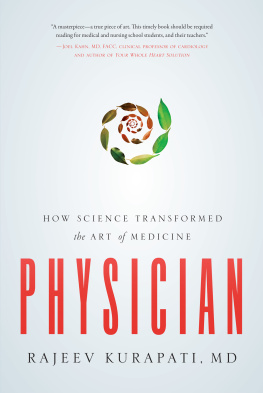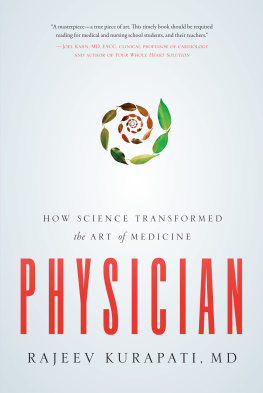
Deviance Among Physicians
The concept of deviance is complex, given that norms vary considerably across groups, times, and places. Society tends to primarily recognize traditional portraits of deviants such as street-offenders and drug addicts. The label deviant is commonly cast upon societys undesirables, but this socially constructed image often overlooks subtlerand arguably more dangerousdeviance. Physician malfeasance is an especially problematic form, given that medical professionals garner trust, autonomy, and prestige from society, which allows them to operate outside of the public eye.
This book responds to a growing number of concerns regarding deviant physician actions such as physically and sexually abusive behaviors, fabricating medical findings and records, and taking advantage of patients (e.g., filing fraudulent Medicaid claims). It explores theoretical explanations for physician deviance, and goes on to consider potential responses such as Medicaid Fraud Control Units, the Questionable Doctors database, and the ability of doctors to police themselves.
The unique perspective offered in this book informs discussions of white-collar crime and deviance and has important implications for researchers, policymakers, and students involved in criminal justice and public policy.
Thaddeus L. Johnson is a PhD Criminology & Criminal Justice candidate in the Andrew Young School of Policy Studies at Georgia State University in Atlanta, GA. An Andrew Young Fellowship recipient, he also serves as a graduate teaching assistant (GTA). Mr. Johnsons research interests include urban violence, police professionalism, and police behavior. His most recent work appears in the Criminal Justice Policy Review.
Natasha N. Johnson is a doctoral candidate in the Educational Policy Studies Department at Georgia State University in Atlanta, GA. Mrs. Johnsons research interests include educational justice/equity/equality, social justice leadership, curriculum development, and critical race and feminist theories. Her most recent work appears in Navigating Micro-Aggressions Toward Women in Higher Education. In 2019, she was recognized as a University Council of Educational Administration (UCEA) David L. Clark Scholar.
Christina Policastro is a UC Foundation Assistant Professor of Criminal Justice in the Department of Social, Cultural, and Justice Studies at the University of Tennessee at Chattanooga. Her primary research interests are in the area of victimization with a specific focus on elder abuse and intimate partner violence. She has published articles on diverse topics, including perceptions of intimate partner violence victims, durable medical equipment fraud, pre-professionals knowledge of elder abuse, and trajectories of recurring victimization among persons with serious mental illness. Her most recent work appears in Journal of Quantitative Criminology, Journal of Interpersonal Violence, and Journal of Elder Abuse & Neglect. In 2017, she received the New Scholar Award from the Academy of Criminal Justice Sciences Division of Victimology.
First published 2019
by Routledge
52 Vanderbilt Avenue, New York, NY 10017
and by Routledge
2 Park Square, Milton Park, Abingdon, Oxon, OX14 4RN
Routledge is an imprint of the Taylor & Francis Group, an informa business
2019 Taylor & Francis
The right of Thaddeus L. Johnson, Natasha N. Johnson and Christina Policastro to be identified as authors of this work has been asserted by them in accordance with sections 77 and 78 of the Copyright, Designs and Patents Act 1988.
All rights reserved. No part of this book may be reprinted or reproduced or utilised in any form or by any electronic, mechanical, or other means, now known or hereafter invented, including photocopying and recording, or in any information storage or retrieval system, without permission in writing from the publishers.
Trademark notice: Product or corporate names may be trademarks or registered trademarks, and are used only for identification and explanation without intent to infringe.
Library of Congress Cataloging-in-Publication Data
Names: Johnson, Thaddeus (Thaddeus L.) author.
Title: Deviance among physicians : fraud, violence, and the power to
prescribe / Thaddeus Johnson, Natasha Johnson & Christina Policastro.
Description: Milton Park, Abingdon, Oxon ; New York, NY : Routledge,
2019. | Includes bibliographical references.
Identifiers: LCCN 2019008475 (print) | LCCN 2019010600 (ebook) |
ISBN 9780429024474 (Ebook) | ISBN 9780367110505 (hardback) |
ISBN 9780429024474 (ebk)
Subjects: LCSH: PhysiciansMalpracticeUnited States. | Medical
personnelMalpracticeUnited States. | Medical ethicsUnited
States.
Classification: LCC RA1056.5 (ebook) | LCC RA1056.5 .J64 2019 (print) |
DDC 344.04/11dc23
LC record available at https://lccn.loc.gov/2019008475
ISBN: 978-0-367-11050-5 (hbk)
ISBN: 978-0-429-02447-4 (ebk)
Typeset in Times New Roman
by Apex CoVantage, LLC
1
Introduction
The concept of deviance is complex, given that norms vary considerably across groups, times, and places. In our society, however, we tend to only recognize traditional portraits of deviants such as street-offenders and drug addicts. That is, the label deviant is commonly cast upon societys undesirables. But this socially constructed and widely accepted image often overlooks subtler, and arguably more dangerous malfeasance. A prime example of such non-conventional criminality is physician deviance illicit or fraudulent acts committed by doctors (e.g., surgeons, dentists, psychiatrists, and so on) for personal gain within the context of their profession. This chapter provides an overview of key themes related to physician deviance including the concepts of trust and power, as well as situates the study of misconduct by medical professionals within its historical context and the broader white-collar crime literature. Finally, this chapter outlines the topics of discussion presented in the remaining chapters of the text.
During visits to our physicians office, hospital, or clinic, most of us would never imagine that the professionals we entrust both our lives and our familys lives with could be exploiting us. While most physicians adhere to the ethos, primum non nocere , a sizable portion victimize the very individuals and systems they solemnly vowed to protect (Iglehart, 2009; Policastro & Payne, 2013). Medical practitioners are hardly the only professional group to prioritize profit and power over everything else (e.g., patient well-being). Unlike other occupations, however, persons within our society place inimitable levels of trust in the verity of health care professionals (Blendon, Benson, & Hero, 2014). More notably, the amount of faith we have in our physicians far surpasses that of other professionals within and external to the medical sector (Gidman, Ward, & McGregor, 2012). Think, for a moment, of doctors inevitable presence in and throughout most of our lives. When we are born, a doctor is there. When we die, they are usually there during our final days. In other words, from our very first moments of existence, we are taught to trust doctors.
Because of physicians privileged or hero status within our society (Arnulf & Gottschalk, 2013), they enjoy unparalleled public confidence and embedded expectations that cannot be understated (Cruess, 2006; Wynia, 2008). Evidence of widespread fidelity to doctors has been observed among the general public and academics alike. Edwin Sutherland (1949), for instance, who first coined the phrase white-collar crime, connoted that physicians were far more honorable than other professionals and, thus, unlikely to engage in occupational deviance (Wilson, Lincoln, Chappell, & Fraser, 1986). Sutherlands stance was undoubtedly inaccurate but reflects the unmatched confidence society has long placed in these clinicians.





